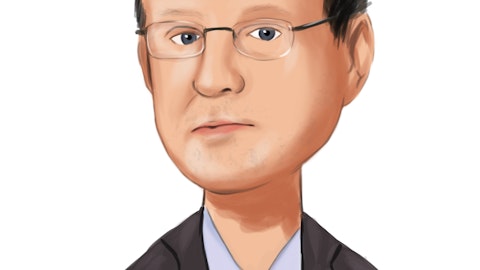Hedge funds and other investment firms that we track manage billions of dollars of their wealthy clients’ money, and needless to say, they are painstakingly thorough when analyzing where to invest this money, as their own wealth also depends on it. Regardless of the various methods used by elite investors like David Tepper and David Abrams, the resources they expend are second-to-none. This is especially valuable when it comes to small-cap stocks, which is where they generate their strongest outperformance, as their resources give them a huge edge when it comes to studying these stocks compared to the average investor, which is why we intently follow their activity in the small-cap space. Nevertheless, it is also possible to identify cheap large cap stocks by following the footsteps of best performing hedge funds.
KeyCorp (NYSE:KEY) investors should pay attention to a decrease in hedge fund sentiment of late. KEY was in 31 hedge funds’ portfolios at the end of June. There were 32 hedge funds in our database with KEY holdings at the end of the previous quarter. Our calculations also showed that KEY isn’t among the 30 most popular stocks among hedge funds (see the video below).

Video: Click the image to watch our video about the top 5 most popular hedge fund stocks.
Hedge funds’ reputation as shrewd investors has been tarnished in the last decade as their hedged returns couldn’t keep up with the unhedged returns of the market indices. Our research has shown that hedge funds’ small-cap stock picks managed to beat the market by double digits annually between 1999 and 2016, but the margin of outperformance has been declining in recent years. Nevertheless, we were still able to identify in advance a select group of hedge fund holdings that outperformed the market by 40 percentage points since May 2014 through May 30, 2019 (see the details here). We were also able to identify in advance a select group of hedge fund holdings that underperformed the market by 10 percentage points annually between 2006 and 2017. Interestingly the margin of underperformance of these stocks has been increasing in recent years. Investors who are long the market and short these stocks would have returned more than 27% annually between 2015 and 2017. We have been tracking and sharing the list of these stocks since February 2017 in our quarterly newsletter.
Unlike some fund managers who are betting on Dow reaching 40000 in a year, our long-short investment strategy doesn’t rely on bull markets to deliver double digit returns. We only rely on hedge fund buy/sell signals. We’re going to analyze the fresh hedge fund action encompassing KeyCorp (NYSE:KEY).
How are hedge funds trading KeyCorp (NYSE:KEY)?
At Q2’s end, a total of 31 of the hedge funds tracked by Insider Monkey held long positions in this stock, a change of -3% from the first quarter of 2019. On the other hand, there were a total of 36 hedge funds with a bullish position in KEY a year ago. So, let’s see which hedge funds were among the top holders of the stock and which hedge funds were making big moves.
The largest stake in KeyCorp (NYSE:KEY) was held by Citadel Investment Group, which reported holding $232.3 million worth of stock at the end of March. It was followed by Millennium Management with a $216.3 million position. Other investors bullish on the company included Pzena Investment Management, Adage Capital Management, and Arrowstreet Capital.
Seeing as KeyCorp (NYSE:KEY) has faced falling interest from the aggregate hedge fund industry, logic holds that there exists a select few hedge funds who were dropping their entire stakes last quarter. Interestingly, Ray Dalio’s Bridgewater Associates cut the largest investment of the “upper crust” of funds followed by Insider Monkey, totaling about $8.5 million in stock. Thomas G. Maheras’s fund, Tegean Capital Management, also sold off its stock, about $7.1 million worth. These transactions are intriguing to say the least, as aggregate hedge fund interest fell by 1 funds last quarter.
Let’s check out hedge fund activity in other stocks similar to KeyCorp (NYSE:KEY). We will take a look at Restaurant Brands International Inc (NYSE:QSR), Franklin Resources, Inc. (NYSE:BEN), ResMed Inc. (NYSE:RMD), and Plains All American Pipeline, L.P. (NYSE:PAA). This group of stocks’ market valuations resemble KEY’s market valuation.
| Ticker | No of HFs with positions | Total Value of HF Positions (x1000) | Change in HF Position |
|---|---|---|---|
| QSR | 39 | 3041086 | 2 |
| BEN | 25 | 636749 | -3 |
| RMD | 10 | 102957 | -8 |
| PAA | 11 | 79838 | 3 |
| Average | 21.25 | 965158 | -1.5 |
View table here if you experience formatting issues.
As you can see these stocks had an average of 21.25 hedge funds with bullish positions and the average amount invested in these stocks was $965 million. That figure was $931 million in KEY’s case. Restaurant Brands International Inc (NYSE:QSR) is the most popular stock in this table. On the other hand ResMed Inc. (NYSE:RMD) is the least popular one with only 10 bullish hedge fund positions. KeyCorp (NYSE:KEY) is not the most popular stock in this group but hedge fund interest is still above average. This is a slightly positive signal but we’d rather spend our time researching stocks that hedge funds are piling on. Our calculations showed that top 20 most popular stocks among hedge funds returned 24.4% in 2019 through September 30th and outperformed the S&P 500 ETF (SPY) by 4 percentage points. Unfortunately KEY wasn’t nearly as popular as these 20 stocks and hedge funds that were betting on KEY were disappointed as the stock returned 1.7% during the third quarter and underperformed the market. If you are interested in investing in large cap stocks with huge upside potential, you should check out the top 20 most popular stocks among hedge funds as many of these stocks already outperformed the market so far this year.
Disclosure: None. This article was originally published at Insider Monkey.







